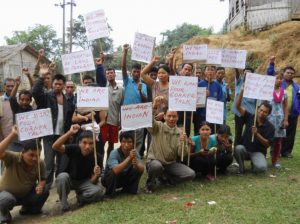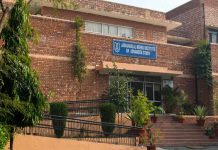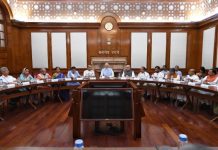 Just when 32, 876 refugees saw some rays of hope, a National Commission for Protection of Child Rights’ (NCPCR) survey conducted by Quality Council of India (QCI) has revealed numerous challenges for Mizoram government to ensure a better future for nearly 7,000 Bru children who were born in relief camps in Tripura and grew up with poor facilities for education, healthcare, sanitation and living condition. An agreement signed on July 3 by Union Home Ministry with Mizoram and Tripura governments and Mizoram Bru Displaced People’s Forum (MBRDF), around 5,407 Bru refugee families will be repatriated to Mizoram by September 30 this year. What came as more worry is that almost one in every 10 children consumes alcohol, tobacco and other drugs.
Just when 32, 876 refugees saw some rays of hope, a National Commission for Protection of Child Rights’ (NCPCR) survey conducted by Quality Council of India (QCI) has revealed numerous challenges for Mizoram government to ensure a better future for nearly 7,000 Bru children who were born in relief camps in Tripura and grew up with poor facilities for education, healthcare, sanitation and living condition. An agreement signed on July 3 by Union Home Ministry with Mizoram and Tripura governments and Mizoram Bru Displaced People’s Forum (MBRDF), around 5,407 Bru refugee families will be repatriated to Mizoram by September 30 this year. What came as more worry is that almost one in every 10 children consumes alcohol, tobacco and other drugs.
The study titled Devising Pathways for Appropriate Repatriation of Children of Bru-Reang Community have suggested that the Centre and Mizoram government needs to take extra measures to ensure that the children get education as per the Right to Education Act and healthcare provided for their better future.
The QCI selected a sample of 837 children, 12 per cent of the total children population, living in all six relief camps in Kanchanpur and Panisagar sub-divisions in north Tripura district, where they have been living since 1997 when an ethnic flare-up forced them to leave their villages in Mizoram and crossed over to Tripura for their lives.
Who are the Brus?
Bru or Reang is one of the scheduled tribes of Mizoram. Apart from Mizoram, Tripura, Assam and Manipur have Bru population who speaks Reang dialect of Kokborok language and which is locally referred to as Kau Bru. The tribe mainly practice agriculture and has been practising Huk or Jhum cultivation since long. Several attempts to repatriate the 5,407 Bru refugee families have got delayed, mainly due to lack of an agreement on the compensation to be provided for their rehabilitation.
In order to identify the challenges, QCI teams visited and captured the conditions of schools, health centres, Anganwadi centres and the skill centres.
Education
In most of the schools and non-residential special training centres, the QCI team visited during the survey, nearly 38 per cent respondents between 0 to 6 years said they were not enrolled in any educational facility. However, in the age group of 6-14, only 9.5per cent are not enrolled, but the percentage of out-of-school children was found to be 35per cent in the age bracket of 14-18. “The reason identified behind the increase in the percentage of out-of-school students in the age group of 14-18 is the absence of educational facilities for secondary education in the camps. A staggering 21.6 per cent of all the respondents said they are not enrolled in any educational facility,” said the survey report released recently.
Nearly 24 per cent of the students admitted in the government schools and 48per cent of the students admitted in NRSTCs said that they do not get books, for free, every year. About 36 per cent of the children going to government school said that they do not get the mid-day meal daily and 31per cent of the children going to NRSTC said that they did not have access to mid-day meal daily while another 20 per cent in government schools and 8 per cent respondents enrolled in NRSTCs said they did not receive mid-day meal at all. .
The QCI survey said the basic educational requirements of children, as defined in RTE Act, 2009, are not being fulfilled in the existing camps of north Tripura. Almost 40 per cent of the children studying in NRSTCs and Government schools of north Tripura do not receive books every year.
“Also, they do not have any educational institutions beyond grade V in or near the camps. And since as many as 7000 children are planned to be repatriated to Mizoram, it is expected to put a lot of strain on the existing resources in the proposed villages. Hence, existing educational institutions in the proposed villages in Mizoram should be assessed, based on parameters:
- The current number of educational institutions as well as their capacity in the proposed villages in Mizoram should be assessed to ensure adequate capacity to accommodate all 7000 children of Bru community along with the existing student population in the respective villages.
- Availability of basic requirements such as books, qualified teachers and infrastructure should be an important part of the assessment to ensure adequate resources and facilities in the institutions.
- Make-up classes and bridge courses should be organised to bridge the age-appropriate-class gap in the children of the community.
- As the mother tongue of the people of the Bru/Reang community is Bru language, the medium of instruction and the textbooks provided in educational institutions should be in Bru language as per the RTE provisions. Other languages such as English, Hindi and Mizo should also be taught in schools to enable them to study or work anywhere across the country.
- Teachers/education volunteers, from the community, should be recruited to work in the schools in proposed villages of Mizoram to ensure continuity and to bridge the language barrier.
Healthcare:
Of the three public health centres near the relief camps, two were found to be functional at Khedacherra and the Gachiram Para.
“The condition of healthcare is deplorable in the camps. Some of the common types of diseases prevalent in the camps are malaria, measles, respiratory diseases and diarrhea. Residents of the relief camps are entitled to receive medicines free of cost, but 97per cent respondents, said that they did not receive medicines from the authorities. Nearly 34per cent of the respondents said that vaccination had not been provided to their children during their growth years,” it said.
The survey recommended that mandatory tests and check-ups of the children of the community should be conducted after repatriation to identify the number of cases of Anaemia, Haemoglobin levels of children, the percentage of children who have received deworming etc. and it should be ensured that adequate remedies and healt hcare are provided to the children of the community.
Sanitation:
Ninety-eight per cent of the respondents said they do not have access to clean drinking water. Most of the respondents had temporary toilets built beside their homes. “There is no system for waste-disposal and as a result, daily waste is scattered across the camps, which might be leading to various diseases among the residents of the camps. It said that the the proposed villages for the Bru community in Mizoram should be assessed by a competent body based on proper sanitation, sewage and waste disposal facilities to ensure clean, hygienic and healthy living conditions for the community after their repatriation within six months and in case any deficiency is detected, necessary augmentation should be completed within a time span of 12 months. “Bru community members do not have adequate knowledge about the proposed villages in Mizoram and are prone to misinformation and rumours spread by stakeholders with vested interests in keeping the community in makeshift camps in Tripura. Hence, serious attempts should be made by Mizoram government to build confidence among the Brus residing in the camps,” said the survey report.
Listing security in Mizoram as one of the most important concerns of the community, the survey said members of the community should be included in different administrative committees at the police station, district and state levels in Mizoram to instill the sense of security.
Skills Development:
Majority of the residents do not have any vocational skills and those who are skilled are not certified, and this is hampering their employability. The QCI survey recommended that a mechanism should be developed to link the skilled labour with the prospective employers and fill the demand-supply gap between employers’ requirements and qualifications of the labour force. “Recognition of Prior Learning (RPL) platform, under Pradhan Mantri Kaushal Vikas Yojana (PMKVY), should be implemented to certify or provide bridge courses to the community members, to enable them to get better employment opportunities in the future. Government is recommended to encourage big industrial players to set up job fairs in these camps,” the report said.
letters@tehelka.com












